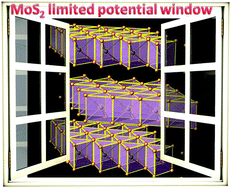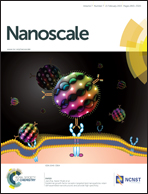A limited anodic and cathodic potential window of MoS2: limitations in electrochemical applications†
Abstract
Molybdenum disulphide has been touted as a good material with diverse possible applications such as an energy storage and sensing platform. However, we demonstrate here the limitation of MoS2 as an analytical sensing platform due to the limited potential window in both the anodic and cathodic regions attributed to the inherent electrochemistry (oxidation of Mo4+ to Mo6+) and the catalytic hydrogen evolution reaction due to H3O+ reduction on the MoS2 surface, respectively. The electrochemical window of MoS2 lies in the region of ∼–0.6 V to +0.7 V (vs. AgCl). We show that such a limited working potential window characteristic of MoS2 precludes the detection of important analytes such as nitroaromatic explosives, pesticides and mycotoxins which are instead detectable on carbon surfaces. The limited potential window of MoS2 has to be taken into consideration in the construction of electroanalytical devices based on MoS2.


 Please wait while we load your content...
Please wait while we load your content...